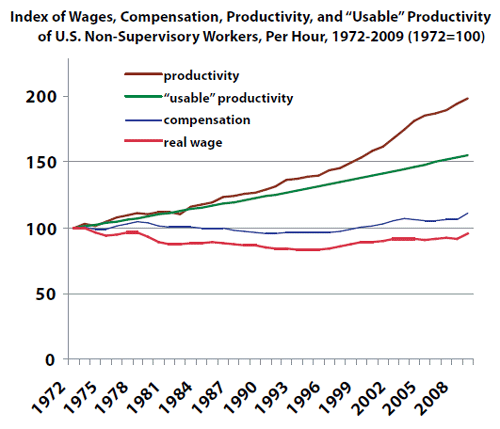
(1) Cover Article All Over the Internets: The news aggregators have been going to town with the cover article for our July/August issue, Universal Health Care: Can We Afford Anything Less?, by Jerry Friedman. Common Dreams picked it up last Friday, and it was the lead story on Truthout on Tuesday. It has been getting some traffic via Reddit and StumbleUpon also.
(2) Sneak Preview for Blog Fans: We've posted another article from the July/August issue, James Cypher's Nearly $2 Trillion Purloined from U.S. Workers in 2009. We won't advertise it on the home page until Monday, but D&S blog fans can get a sneak preview (and magazine subscribers have already seen it). Jim starts from the familiar point that, while wages used to go up alongside productivity, they have stayed basically flat since the early 70s, even as productivity has gone up. How much that would have gone to workers now goes to management, aka the bosses? Jim estimates that figure as almost $2 trillion for 2009 alone. The image at the top of this blog post is the graph from Jim's article.
(3) New Website Targets ASARCO: We heard from Lin Nelson and Anne Fischel, authors (with Mara Kardas-Nelson) of Bankruptcy as Corporate Makeover, about hyper-polluting company ASARCO. They've started a website, Their Mines, Our Stories, for their wonderful work on this horrible company and its impact on communities. Here's what they have to say:
Since 2005 we've documented the experiences of communities that have lived, worked and struggled with ASARCO, the American Smelting and Refining Company. Our work involves research, video, photography, oral history and analytical writing to document ASARCO's history and its impact on several communities in the U.S. and Mexico. Our intent is to learn about and document the struggles of residents, workers and unions to activate their democratic right to know about the conditions affecting their health, safety, and well-being. Too often the memories, struggles and knowledge created in communities are forgotten or minimized. We have been learning with communities facing serious threats, and we believe it is vital that people's experience, insight and judgement be respected and be at the center of our thinking about industrial risk.
ASARCO is not unique among U.S. corporations. But some factors make it especially significant--the long arc of its history, the wide reach of its operations, its contentious interactions with citizens, workers and public agencies, its attempts to influence science, its impact on public policy, and its precedent-setting chapter 11 bankruptcy, the largest and most complex environmental bankruptcy in U.S. history. Once a U.S. company with holdings on almost every continent, ASARCO is now a wholly-owned subsidiary of Grupo Mexico, the Mexican company it helped to create. ASARCO's bankruptcy reorganization is a disturbing forecast of what corporations can do to escape their responsibilities to the workers and communities they have used and abused.
Our multi-media project is documenting this complex story. We have been frequent visitors to Asarco-impacted communities in Washington, Texas and Arizona, as well as to Mexico's historic Cananea copper mine, now operated by Grupo Mexico. We have been privileged to spend time with union activists and their families, former workers, environmentalists, public health advocates, agency staff, public officials and affected community residents. This process has provided us with a wealth of material. The website enables us to share some of what we've learned in a form we hope will be useful to students, teachers, researchers, labor and environmental health advocates and communities grappling with similar issues. We are also working on several articles and a documentary film that we expect to complete by the end of 2011.
Their Mines, Our Stories is a case study of one corporation in a complex relationship with many communities. While not unique, it dramatizes on a broad canvas how a corporation can occupy a major role in public and community life, and demonstrates the consequences when a company evades responsibility for the communities it has polluted, the workers it has endangered, and the public trust it has violated.
(4) Help with Procrastination: D&S pal and time-management expert Hillary Rettig is putting out a new book for writers on procrastination, perfectionism, and writer's block. The book, entitled The Seven Secrets of the Prolific, will feature illustrations by D&S contributing cartoonist Barry Deutsch! Hillary is raising money for production of the book via the microfunding site Indiegogo. Check it out to contribute and pre-order this great book! D&S readers may also be interested in Hillary's earlier book The Lifelong Activist.
(5) D&S Co-Editor on the Radio: D&S co-editor Chris Sturr (that's me) was interviewed yesterday on KKFI Kansas City. The program is the Heartland Labor Forum ("Radio that Talks Back to the Boss"). The interview was about the recently published second edition of our anthology Real World Labor. The archive of the show hasn't been posted yet; I'll let you know when it is.
(6) Our Dry-Season Fundraiser: We ask you to please consider making a donation to our summer "dry-season" fundraiser, which we'll keep pushing for through the month of July. The big incentive is that we'll give you a copy of John Millerand Arthur MacEwan's new book, Economic Collapse, Economic Change, if you you donate $50 or more. It's a wonderful book! I am on Chapter 7 and enjoying it immensely.
--Chris Sturr
